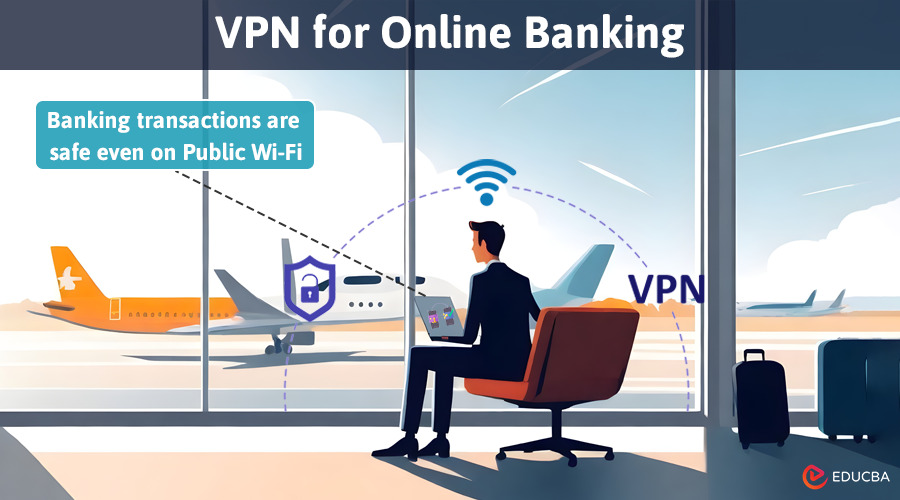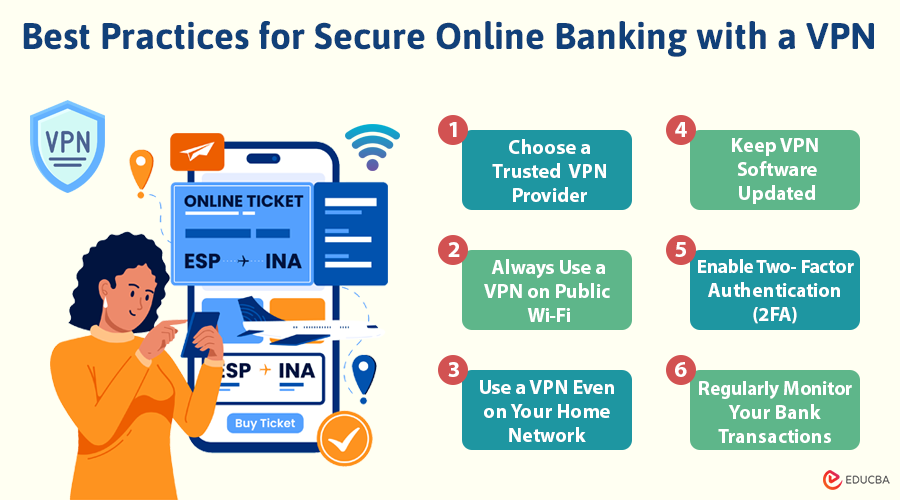
VPN for Online Banking: Why You Need It?
Imagine sitting at an airport, checking your bank account using the airport’s free Wi-Fi. It might feel convenient, but public Wi-Fi isn’t always safe. Here’s where a VPN comes in handy. When you use a VPN for online banking, you can safely access your online banking account. It keeps your financial information secure from hackers and unauthorized access. So, using a VPN for online banking is generally secure.
Let’s explore why a VPN is essential for keeping your financial information safe and how to use it effectively for any banking transaction.
Benefits of Using VPN for Online Banking
Some security benefits of using a VPN for online banking are as follows:
#1. Secure Connection
When you perform online banking transactions, a credible VPN service will always use secure tunnelling protocols. This means a protected connection between your device and the VPN server exists. Therefore, your banking data, including your passwords, account numbers, transactions, etc, are shielded from malicious parties.
Additionally, understanding how to change the NAT type can help optimize your VPN connection, as NAT can improve the VPN’s stability and performance.
#2. Encryption
When you connect to a VPN and browse your banking website or app, the VPN transforms your data into an unreadable format. Therefore, anyone, including hackers, cannot intercept (read or capture) it. This is especially important when you are using public Wi-Fi networks while accessing banking websites.
#3. IP Masking
When you open your banking app or website while connected to a VPN, the service masks your real IP address. It replaces it with one from the VPN server, making it much harder to trace your activities.
Step-by-Step Guide to Using a VPN for Online Banking
Here’s a simple guide to securely access your bank account using a VPN:
For Desktop:
- Buy and Install a reputable VPN provider’s app on your computer.
- Open the VPN app and select a secure server location close to your region for better speed.
- Connect to the VPN by clicking the connect button.
- Open your online banking account and complete your transactions.
- Disconnect from the VPN once you are done.
For Mobile:
- Buy and Install the VPN app from a credible provider.
- Open the VPN app on your mobile.
- Open your banking app or website on your mobile.
- Disconnect the VPN when your transaction is complete.
Best Practices for Secure Online Banking with a VPN
- Choose a Trusted VPN Provider
Use a VPN service provider with strong encryption and a strict no-logs policy. This will ensure robust privacy and protection during online banking.
- Always Use a VPN on Public Wi-Fi
Always use a VPN when accessing online banking on public Wi-Fi, as these networks are more vulnerable to attacks.
- Use a VPN Even on Your Home Network
Even when accessing banking services on a secure home network, use a VPN.
- Keep VPN Software Updated
Regularly update your VPN software, as outdated versions may expose your data to vulnerabilities.
- Enable Two-Factor Authentication (2FA)
Activate 2FA for your online banking accounts to add an additional verification step beyond your password.
- Regularly Monitor Your Bank Transactions
Regularly review your bank transactions and immediately report any suspicious activity to your bank.
- Avoid Free VPNs
Free VPN services often compromise on security features. Therefore, opt for a reputable, paid VPN provider.
Potential Risks + Solutions for Using a VPN in Online Banking
#1. VPN Trustworthiness
Some VPN providers may have security vulnerabilities that compromise your data.
Solution: Choose a reputable VPN provider that offers a strict no-logs policy.
#2. Connection Speed
Sometimes, your internet connection may slow down while using a VPN. This can be an issue, especially when you are performing an online banking transaction.
Solution: Choose a provider known for fast and reliable connections.
#3. Compatibility Issues with Banking Platforms
Some banks may block VPN traffic. This can prevent you from logging in or accessing certain features.
Solution: Adjust your VPN settings (e.g., changing servers) or temporarily disable the VPN while accessing your account, but only on a secure and trusted network.
Final Thoughts
When you use a VPN for online banking, it provides extra security, especially when you’re on public Wi-Fi or accessing your account from different locations. However, make sure you choose a reliable VPN provider and be aware that it might slow down your internet connection a bit.
Frequently Asked Questions (FAQs)
Q1: Can my bank detect if I use a VPN?
Yes, some banks may detect VPN usage. Also, certain banks might flag VPN traffic as suspicious and can block access until you verify your identity.
Q2: Is using a VPN necessary on a mobile device?
Yes, since mobile devices are often used on public networks, they are vulnerable.
Q3: Is using a VPN for online banking legal?
Yes, using a VPN for online banking is generally legal in most countries. However, some regions have specific regulations or restrictions on VPN usage.
Q4: Are there any countries where using a VPN is restricted?
Yes, countries like China and Russia have strict regulations on VPN usage, and using unauthorized VPNs could result in penalties.
Q5: Can I access my bank account while using a VPN in restricted countries?
You may encounter issues as some banks might block VPN traffic, or local laws might limit your access.
Q6: What should I do before using a VPN for online banking in another country?
Always check local laws and ensure your VPN complies with regulations before using it for banking.
Recommended Articles
We hope you found this article on ‘VPN for Online Banking’ insightful. For more VPN-related content, refer to the posts below.


